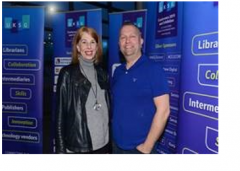For many of us, the summer will already seem like a distant memory and the Christmas break will probably already be uppermost in peoples’ minds. The ongoing restrictions on foreign travel across the globe mean that most of us will not have enjoyed the longed-for summer vacations that we would normally take this year, but our editorial team did manage to take their annual break and come back refreshed and ready to bring you another year of fascinating, stimulating and challenging articles.
As always, we bring you a mix of practical/operational articles and articles which tackle the big issues of the day, including, of course, open access (OA). Insights returned in early September with a very uplifting and positive article, entitled How to strive for success, happiness, fulfilment and impact: a personal manifesto, in which Tom Shaw sought to make sense of the new thinking, reflection and ideas that come with starting a new job and explored the intersection of the professional and the personal.
In their article, So, you want me to read for my degree?, Sarah Pittaway and Michelle Malamo present a case study on a collaborative project undertaken between Library Services and the School of Education at the University of Worcester, which challenged students to understand the importance of reading to their academic success and utilized a Universal Design for Learning approach to enable all students to access reading materials in a variety of formats using accessibility tools.
Continuing the theme of accessibility, Elena Azadbakht, Teresa Schultz and Jennifer Arellano present the findings of their research into the accessibility of e-textbooks. They posited that in order for open educational resources (OERs) to be truly open to all, they must be accessible to learners with a wide range of disabilities and sought to determine the accessibility of a randomly selected sample of open textbooks using the W3C Web Content Accessibility Guidelines (WCAG).
In a world where libraries have seen a huge amount of change and a rapid escalation in the transition to online delivery, we welcome William H. Walters and Susanne Markgren’s article which takes a fresh look at the age-old challenges associated with selecting and deselecting journals. Instead of focussing on deselection, they argue that better results can be achieved through a two-stage process focussed on identifying ‘wanted journals’ which can minimize costs and avoid bias toward the library’s historic holdings.
It would be remiss of Insights to not bring you new thinking from the world of open access, so we were pleased to publish Rita Pinhasi, Lothar Hölbling and Brigitte Kromp’s article which paints a superb picture of the Austrian transition to OA, focussing in on the ‘Austrian Transition to Open Access’ (AT2OA) collaborative project, which initially ran from 2017 to 2020. The project aimed at enabling the large-scale transformation of publishing outputs from closed to open access in Austria, and brought together all key stakeholders: universities, research institutes, the national library consortium and the Austrian Science Fund. This national initiative has recently secured funding for a second four-year cycle, so we look forward to being able to bring you news about further successes in the future.
We also welcomed the return of Jill Emery and Graham Stone, who updated their 2018 work on TERMS (Techniques for Electronic Resources Management), envisaging a post-Plan S e-resources life cycle which seamlessly blends e-resources and open access content management workflows in a post-Plan S world. The authors argue that open access has become a mainstream content management consideration for librarians and libraries.
It would be very easy to view open access from just the institutional or library standpoint, so we were extremely pleased to accept Shaun Yon-Seng Khoo’s article for publication in Insights. Shaun, a Postdoctoral Fellow at the University of Montreal, presents a personal perspective of the significant administrative and legal burdens that he sees the Plan S Rights Retention Strategy placing on authors and readers. He raises concerns over increased complexity in the copyright and licensing landscape, the perception that publishers have begun implementing strategies that ensure they can protect their revenue streams, and highlights the potential challenges left to authors who may have to choose between paying publication fees and complying with their funding agreements.
In our busy lives, it is so easy to forget to take a moment to pause and look back over the range and quality of articles that we’ve published in recent years. More fascinating still is to see how other experts view the articles that we have published. With that thought in mind, we have been delighted to launch our second special collection, Discovery is the researcher’s dream, under the guest editorship of Magaly Bascones and Rebekah Cummings. We are extraordinarily grateful for the hard work that has gone into this curated collection of articles exploring the many facets and challenges associated with the use of metadata in facilitating discoverability.
Melissa Belvadi has recently presented the findings of a 30-year longitudinal study into longevity of print book use at a small public university in Canada while Cameron Neylon and colleagues have taken a look at the benefits of open access for scholarly books. Over the coming weeks we look forward to publishing more fascinating articles on the widest range of topics, including funding of OA initiatives, subscription-to-open models, accessibility, data protection in citizen science research and good practice in research data management.
We will, of course, also be bringing you further insights into what we continue to learn from the community’s response to the Covid-19 pandemic and more practical perspectives on the challenges facing the scholarly communications community as we move forward.
As always, we continue to welcome article submissions and proposals for new research themes and topics, so please send in your ideas.
Lorraine and Steve

